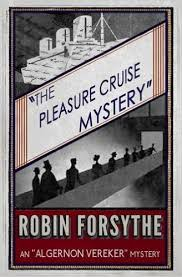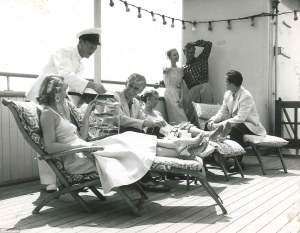Source: Review Copy (Dean Street Press)
Vintage Mystery Scavenger Hunt: Boat

This is the third Forsythe novel I have read and at the start of The Pleasure Cruise Mystery (1933), Anthony Vereker (known as Algernon) is feeling down after his latest artwork was scorned by the critics. His friend Manuel Ricardo, ever keen to help cheer up a friend, urges him to go on a holiday cruise with him on a boat called the Mars. The fact the epicurean Ricardo needs Algernon to pay for both their passages, of course doesn’t influence him in anyway. Algernon is not easily convinced, shuddering at the thought of all the organised fun and socialising. Ricardo will not be beat though and I think here Forsythe humorously plays around with and utilises advertisement language and patter.
Initially Algernon regrets being persuaded to go on the cruise, though this is abated slightly, as he gets to observe the other guests aboard the ship. Firstly there is Beryl Mesado, a woman who is keen to remain unobserved and her elusiveness affords Algernon and Ricardo an opportunity to play “Holmes” and make deductions about her. Beryl is accompanied by her sister and brother in law, the Colvins. Ricardo’s interest unsurprisingly, given his focus on women, is upon Rosaura Penteado, an Argentinian heiress, though it seems he has competition for her attentions from Miguel Dias, a fellow countryman.

Forsythe’s employment of classical allusions is something which has interested me as I have read this novels and the way they can convey a lot of meaning in a succinct way. For example, Ricardo’s refers to their evening meal as ‘Trimalchio’s feast,’ which is an allusion to an ex-slave character from Petronius’ Satyricon, (a text also mentioned in Missing or Murdered (1929)) who uses his wealth to host a rather gaudy and tasteless feast. Trimalchio has become synonymous with the negative tropes associated with members of the nouveau riche such as vulgarised behaviour and lack of sophistication (Potter, 2010). Consequently Ricardo’s short phrase is able to concisely offer an opinion on the cruise holiday and its’ guests. Interestingly aboard the Mars ship, a song called the Venus on earth is played and I felt this mention of the planets which have gendered associations were a subtle symbol of the gender dynamics aboard the ship, with relationships forming or disbanding and attempts by men and women to get the upper hand over the opposite sex.
Algernon’s interest in the cruise takes a meteoric rise when on two separate nights he hears voices in Beryl’s cabin say:
‘You’ll have to do the job as soon as possible. I can’t stand this any longer.’
And
‘It’s all up…remember it’s murder.’
And indeed this voice is correct, as Ricardo taking a very late night stroll (having been kept awake by the ship’s foghorn) falls over Beryl’s body, a body which raises a lot of questions for Algernon such as the disappearance of her expensive necklace, the incorrect gloves she wears and the lacerations on her hands. The Colvins say that Beryl had a heart condition and could have died at any moment, but neither Algernon nor the ship’s doctor is entirely convinced. However, an open investigation of the death is prohibited by Captain Patridge, who is keen to avoid any bad publicity.
To get around this issue Algernon focuses on the missing necklace, though it seems through witness discrepancies that there are two missing necklaces. Out of the three cases Algernon has been involved in and which I have read, this is his most complex and complicated case, as there is more than one criminal plot involved and it is Algernon’s task to separate them out and unravel all the lies he is being told. Due to the discreet nature of the investigation on the ship, conversation is a powerful tool, which both Algernon and Ricardo employ, reminding me a little of Christie’s A Caribbean Mystery (1964). Although Ricardo’s role is predominantly that of pumping information from the younger women in the case.
The complexities of the case take Algernon off the ship (leaving Ricardo behind) and on a journey which leads back to the UK, where Algernon believes the crimes began and Inspector Heather also makes an appearance, though his role is more of an observer than a participant. Playing on lower class women’s affections for information, a trope frequent in Annie’s Haynes novels from the period, is also present but to a much minor degree.
Overall I think the second half of the novel is slower in pace than the first, with the numerous complexities of the case being unfolded quite slowly, which is mainly achieved by the fact many of the witnesses in the case have misinterpreted and misread things they saw which affected Algernon’s ideas. It could be said this section of the novel is rather spun out, with a rather long discussion between Inspector Heather and Algernon, as although the basic outline of the crimes is established first, the identity of the culprits is more obscured, as each witness has a different version of how the same events happened, leading to a different person looking guilty each time. As mentioned the solution to the mystery is a complicated one, though the motivations behind the crime being done this way does stand scrutiny. However, I am still undecided as to whether the complexities of this case make it a sneaky good one or make it an Icarus moment for Forsythe, who perhaps overreached himself.
In my review to Forsythe’s The Polo Ground Mystery (1932) I noted the strong nod to the works and style of Oscar Wilde and to an extent I think this can also be found in this story. For example, Ricardo is able to defend and mock “the arts,” such as when he says:
‘We’ve built altars to mass production and smashed up the shrines to Venus.’
In addition, in keeping with the Wildean connection, there are points in the book which have a fin de siècle atmosphere. However, I think in contrast to The Polo Ground Mystery, the Wildean connection takes a more troubling turn as Ricardo’s involvement at the end of the case shows a witty, yet emotionless and careless detachment to the mystery, which does come across as ethically dubious.
Rating: 3.75/5 (My primary reason for this rating is that I think the second half of the book needed a faster pace)
See also:
http://moonlight-detective.blogspot.co.uk/2016/01/between-devil-and-deep-blue-sea.html
Bibliography
Potter, D. (2010). A Companion to the Roman Empire. Oxford: Blackwell Publishing.
Thanks for the review. 🙂 It’s slightly disappointing that the other novels by Forsythe’s don’t seem to outstrip ‘Polo Ground Mystery’, and deliver something great. But at least they still sound like they make for good reads. 🙂
LikeLiked by 1 person
Yes they are definitely worth reading, especially if you like a Wildean tone and for some of the things I no doubt quibble about it is down to individual readers’ taste, especially with perceptions of pace.
LikeLike
I was very interested to read this review. I read this book recently and it was the first Forsythe I tried. Possibly this was a mistake as it seems it’s not his best. The humorous exchanges between Vereker and Ricardo, which in the hands of another author might have been witty and sparkling, were overdone and in the end quite tedious. By the end of the novel I had lost interest in the solution and just wanted to reach the end. Still, I shall try the others in the series and see if they can alter my first impression.
LikeLiked by 1 person
Yes I think I was quite lucky that I began with The Polo Ground Mystery, as I think Forsythe doesn’t over do the Vereker and Ricardo exchanges and that his pacing is better. The solution does take a long time to come about in The Pleasure Cruise Mystery.
LikeLike
[…] was one of my most unsatisfactory cases.’ I think after attempting a very complicated mystery in The Pleasure Cruise Mystery (1933), Forsythe has gone for a simpler one this time […]
LikeLike
[…] Murdered (1929), The Polo Ground Mystery (1932) and The Ginger Cat Mystery (1935) or in the case of The Pleasure Cruise Mystery (1933) with the serial amateur sleuth Anthony Vereker (Algernon) and his friend Manuel Ricardo. […]
LikeLike
[…] woman possible, and b) is even worse than Vereker at using twenty words when one would have done. Kate over at Cross Examining Crime enjoyed this aspect of the tale, but, being more of blunt instrument, it just kind of annoyed […]
LikeLike
[…] novel. Examples include Murder in the Submarine Zone (1940) by Carter Dickson, Robin Forsythe’s The Pleasure Cruise Mystery (1933) and Death on the Nile by Agatha Christie (1937). A closed world setting allows the writer to […]
LikeLike
[…] The Pleasure Cruise Mystery by Robin Forsythe (Item: Boat) […]
LikeLike
[…] Crossexamining Crime […]
LikeLike